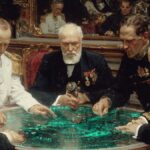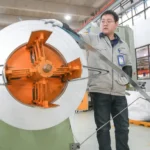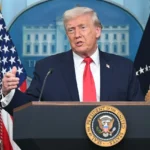Table of Contents
Since Donald Trump took office, Russia’s position on arms control has been anything but consistent. From initially expressing interest in dialogue to outright dismissing it, Moscow’s unpredictable approach to strategic arms agreements has created both challenges and opportunities for global security. As Europe faces growing security concerns and evolving geopolitical dynamics, it must seize the moment to assert itself in the arms control debate, balancing deterrence and cooperation with both Russia and the United States.
In this post, we’ll explore the key issues surrounding Russia’s shifting stance on arms control, why Europe must take a more active role in arms control discussions, and how these developments could impact the future of nuclear nonproliferation.

Russia’s Shifting Position on Arms Control
Since the Trump administration took office, Russia’s messaging on arms control has been inconsistent. Early on, the Kremlin indicated interest in renewing arms control dialogues, but this was quickly followed by a dismissal of such discussions, citing distrust and a hostile global environment. In the spring of 2025, Russia signaled a potential shift, with officials suggesting that they were open to resuming talks on strategic stability—but only if European nuclear powers like France and the United Kingdom were included in any future agreements.
This inconsistency, though frustrating, may present a unique opportunity for Europe to reassert itself in strategic arms discussions. While Russia’s approach may be a stalling tactic, it also reflects growing geopolitical shifts and the changing nature of global nuclear diplomacy.

The Case for European Involvement in Arms Control
So why should European states like France, Germany, and the United Kingdom be interested in arms control now, especially when their focus is often on deterrence and defense capabilities? The answer lies in the intersection of deterrence and arms control, as well as European security interests in the face of evolving nuclear threats.
1. Reducing the Risk of Nuclear Use
One of Europe’s key concerns is reducing the likelihood of nuclear conflict, especially in light of the war in Ukraine. The potential for regional crises to escalate into nuclear confrontations has increased dramatically. In the fall of 2022, U.S. intelligence indicated that the risk of Russian nuclear use could be as high as 50% due to the ongoing conflict. Europe, being geographically close to Russia, would be on the front lines of any nuclear escalation. As such, risk reduction through arms control is critical to maintaining stability and peace on the continent.
2. Upholding the Nuclear Non-Proliferation Treaty (NPT)
Another important reason for European interest in arms control is to strengthen the global nuclear order. The NPT has been the cornerstone of global nuclear disarmament efforts, but the treaty’s credibility has weakened in recent years, especially after two failed Review Conferences in 2015 and 2022. By engaging in arms control efforts, particularly with Russia and China, Europe can demonstrate its commitment to the NPT, ensuring that it remains a central framework for future nuclear negotiations.
3. Enhancing Transparency and Information Sharing
Arms control agreements are not just about reducing weapons but also about increasing transparency and sharing critical information about nuclear capabilities. Europe has often been left in the dark regarding Russia’s strategic planning, with limited access to critical data. Arms control agreements can provide valuable insight into Russia’s nuclear doctrine and military posture, which would directly influence Europe’s defense planning. Transparency in this regard is one of the most valuable assets Europe can gain from engaging in arms control discussions.
4. Preventing Sidelining in Future Deals
Given the geopolitical reality of a growing U.S.-Russia-China triangle, European states must ensure they are not sidelined in future arms control agreements. If the Trump administration were to engage with Moscow on nuclear disarmament without consulting European partners, it could undermine the security interests of NATO and the European Union. By leading the way in arms control discussions, Europe can help shape future treaties and ensure that its concerns are adequately addressed.

The Way Forward: A New Approach to Arms Control
In light of these considerations, Europe must play a more prominent role in arms control efforts, both independently and in coordination with the United States. This will require a comprehensive strategy that balances deterrence with diplomatic engagement. Here are some steps Europe can take to engage effectively in arms control:
1. Develop a Unified European Arms Control Strategy
NATO members, especially France and the United Kingdom, should work to develop a cohesive arms control strategy that aligns with both deterrence and cooperation. This strategy should emphasize behavioral arms control—focused on transparency, risk reduction, and the management of nuclear threats—as opposed to just reductions in weapons stockpiles.
2. Strengthen the P5 Process
As permanent members of the United Nations Security Council (UNSC) and key players in the NPT, France and the United Kingdom are uniquely positioned to strengthen the P5 Process. This includes engaging Russia and China in meaningful dialogues about nuclear risk reduction and transparency. The P5 should aim to create crisis stability mechanisms, such as communication channels and early-warning systems, to reduce the risk of accidental nuclear conflict.
3. Engage Early with the Trump Administration
Europe should actively engage with the Trump administration to ensure its interests are represented in any future arms control deals with Russia and China. Clear communication on the potential consequences of sidelining Europe in these discussions will help prevent strategic misalignments and ensure that arms control efforts reflect the security concerns of all parties involved.
4. Prioritize Risk Reduction
Arms control isn’t just about cutting weapons; it’s also about reducing risks of nuclear escalation. In the face of Russia’s increasing reliance on nuclear weapons, Europe must focus on cooperative strategies to prevent escalation during times of crisis. Whether through informal agreements or formal treaties, Europe should prioritize efforts that prevent nuclear war through restraint and confidence-building measures.

Conclusion: Europe’s Strategic Role in Arms Control
As Russia continues to shift its stance on arms control, Europe has a unique opportunity to step up and shape the future of global arms control. By engaging with the United States and Russia, Europe can help ensure that arms control is not only about reducing arsenals but also about reducing risks and enhancing transparency in nuclear relations.
Europe must act decisively and coordinate its actions with the United States, while maintaining its strategic autonomy in the face of evolving global threats. With a clear strategy and commitment to arms control, Europe can play a pivotal role in creating a more secure and stable world.
Author Profile
- Syed Tahir Abbas is a Master's student at Southwest University, Chongqing, specializing in international relations and sustainable development. His research focuses on U.S.-China diplomacy, global geopolitics, and the role of education in shaping international policies. Syed has contributed to academic discussions on political dynamics, economic growth, and sustainable energy, aiming to offer fresh insights into global affairs.
Latest entries
 U.S. Foreign PolicyFebruary 2, 2026AI and Grand Strategy: The Case for Restraint – Navigating the Future of American Power
U.S. Foreign PolicyFebruary 2, 2026AI and Grand Strategy: The Case for Restraint – Navigating the Future of American Power National SecurityJanuary 31, 2026Treating China’s Connected Energy Systems as a National Security Risk
National SecurityJanuary 31, 2026Treating China’s Connected Energy Systems as a National Security Risk Global HealthJanuary 29, 2026The Future of the WHO—and How the United States Can Shape It
Global HealthJanuary 29, 2026The Future of the WHO—and How the United States Can Shape It Global TradeJanuary 22, 2026Trump Cancels Tariffs on European Nations Over Greenland Pursuit?
Global TradeJanuary 22, 2026Trump Cancels Tariffs on European Nations Over Greenland Pursuit?



4 comments
I’ve read some good stuff here. Definitely worth bookmarking for revisiting. I wonder how much effort you put to create such a magnificent informative website.
Thankyou for all your efforts that you have put in this. very interesting info .
I know this if off topic but I’m looking into starting my own blog and was curious what all is needed to get setup? I’m assuming having a blog like yours would cost a pretty penny? I’m not very web smart so I’m not 100 certain. Any suggestions or advice would be greatly appreciated. Thank you
Some genuinely select articles on this site, saved to favorites.